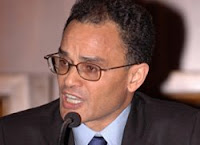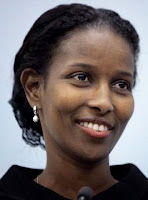 Awed admiration
Awed admirationSometimes you just have to let the jaw drop in awed admiration at the ability of a very large proportion of the opinion writers in the Irish papers to unblushingly say the most obvious nonsense imaginable.
The moment I saw the first sentence of John Waters' piece in today's Irish Times was one such occasion. When I saw the second sentence was another, and so on for the whole length of the article.
The overall effect is that of a slavish premature obituary for the present pope, with a touch of Book of Revelation, a dash of paranoid fantasy about media conspiracies against religion and topped off with a good old-fashioned whopper of an embarrassing factual error.
The temptation is to take the whole thing apart line by line, but I have neither the time nor the energy to do that, and you probably have neither the time nor the inclination to read the result. Allow me, however, to give you a few of the lowlights of his effort.
Breathless praise for the pope
For hagiographical nonsense, check this out:
If we care to contemplate the irrelevance of chronological age, let us consider that last week marked the 81st birthday of the most radical voice in modern Europe. Benedict XVI, now three years into his papacy, has already confounded his enemies and delighted his admirers in a pontificate that glitters beyond all expectations."...the most radical voice in modern Europe"? What is he talking about? This pope has done practically nothing at all in updating the doctrine of the roman catholic church since his elevation to the Holy See (with the possible exception of allowing the publication by a catholic body of a document that made the very unradical claim that limbo, after all, doesn't exist). His encyclicals have been all on subjects carefully selected as uncontroversial and his public statements have been if anything more circumspect than they were in his time as god's Rotweiler.
As for a pontificate that "glitters beyond expectations"? Where does that come from? Even Eoghan Harris wouldn't talk in such terms about Bertie's time as Taoiseach. Perhaps what Waters means is that his first three years on the throne of Peter hasn't been quite the disaster some of the church's pessimists predicted it would be. But his performance wouldn't need to be glittering to have exceeded some of those expectations.
 Explaining reference to the pope's "radical voice" later in his gush, Waters tells us that the "baptism of Magdi Christian Allam is an example of Pope Benedict's radicalism" but fails to tell us why (though he does characterise it as a gesture "worth a hundred million words").
Explaining reference to the pope's "radical voice" later in his gush, Waters tells us that the "baptism of Magdi Christian Allam is an example of Pope Benedict's radicalism" but fails to tell us why (though he does characterise it as a gesture "worth a hundred million words"). Some people become catholics, and if they are prominent enough, get to be baptised by the pope. That the pope did the honours on Allam is supremely unsurprising.
Now if the pope meant the baptism as the ecclesiastical equivalent of a two-fingered salute to islamic absolutists, then bully for him, but it was hardly a particularly radical act for him to personally receive a celebrated journalist into the arms of the church (no more than was his welcome for Tony Blair to the one true religion). The act was far less radical -- not to mention less original -- than the Dutch Liberal Party were when they accepted at least equally brave (but at that time far less prominent) ex-muslim Ayaan Hirsi Ali as a parliamentary candidate. If the Dutch Liberals could be accused of opportunism (an accusation that surfaced more than once -- from christian circles, amongst others), then the same could be more easily said of the Holy See.
Incidentally, Waters crassly misrepresents Allam when he characterises him as believing that Hitchens and Dawkins are leading us blindly to "the suicide of our civilisation". What Allam was in fact referring to when he used the phrase was the awful habit of the liberal left to use an ethic of multi-cultural tolerance as an argument against expecting civilised behaviour from conservative islamic immigrants to Europe (see John Hooper article here, which quotes Allam in context). Allam apparently sees such tolerance of intolerance as extremely dangerous. Waters knows (or should know) that Allam's not the first person to say this. Indeed he's only agreeing with Hitchens and Dawkins, who have both been saying precisely this since well before 9/11.
Here's another piece of breathless nonsense (and there's literally one in nearly every sentence)
...what has emerged is what was implicit in his magisterial writings over several decades: a supreme intellect mounted in a most animated humanity, a man who in his lifetime has watched mankind lurch between great good and the greatest evil, and seeks to reconcile these observations with the truths he has inherited.On the subject of Benedict's "supreme intellect" and his "magisterial writings" have a look a previous blog of mine, Benedict's love of truth. In this blogger's humble, the material associated with the Regensberg and La Sapienza controversies at least look more like political watchyourbackery than intellectual brilliance -- cuteness rather than acuity. He may have written more interesting stuff, but I ain't seen it yet.
The love and hope apocalypse
For Waters' analysis of where the modern world is going astray, take a look at this:
The two most pressing issues of our time [are] the haemorrhaging from public language of, respectively, love and hope.No reason to believe this to be a burning issue is offered. He doesn't give us an explanation of what he (or the pope) even means by it. The assertion simply leaves you at a loss. Perhaps there's something poetic going on and he simply wants to paint a picture of hatred and despair in contemporary society, possibly to provide support for his notorious nostalgic streak (which got a withering mention recently in Roy Foster's 'Luck and the Irish'). Personally, I don't see either term being used less often in public than when I was a smaller and less aggressive, but even if it did, I'm not sure it would worry me more than climate change, or the newly emerging global food-supply crisis, or the appalling state of matters in the Middle East, or in Sub-Saharan Africa. The workings of Waters' mind are mysterious indeed.
This bit sounds like a more typical apocalyptic vision, more suitable to the end of the 10th Century than the start of the 21st:
[The 60's revolution] adherents, ... alarmed by the listlessness of theirJust who's looking for reassurance here? Is he trying to convince himself that those who agree with Dawkins and Hitchens are in a way religious too, or are at least searching in vain for the religion that Waters has found? Either way, he's fails to offer us any reasons why we should think so too.
children and the imminence of the darkness[!] they have themselves summoned, now cry out for reassurance to Richard Dawkins and Christopher Hitchens...
The evil media
Waters (despite the fact that his attitudes are typical of a very large part of the Irish journalistic establishment) has it in for the media.
[at the time of his elevation] Benedict was, by the secular media analysis, a stop-gap and a throwback, a "reactionary", a "right-winger", an obscurantist.Leaving aside who exactly said all this (the majority of the Irish media, despite the misgivings of many, stayed largely, and in my opinion a bit too tamely, silent -- though they did occasionally quote catholic liberals' misgivings on the church's choice of CEO), Waters implies that these secular media were wrong. But if they did indeed have such attitudes then they were pretty clearly right in almost all respects. The pope obviously wants to turn the clock back on many of the achievements of the Enlightenment (or, in Waters' wince-inducing euphemism, to "spearhead a new Enlightenment"). What words other than 'throwback' or 'reactionary' would describe such an attitude better? And the same pope intervened publicly on many occasions in favour of the parties that cluster around Silvio Berlusconi and not once in favour of the Italian left or centre before the recent Italian general election. What expression fits better than "right-wing" for such behaviour?
As for this:
One of the many paradoxes of being pope in the modern world is that you must speak through a megaphone controlled by your enemies.The pope runs a radio station, effectively controls hundreds of others, has thousands of publications in his pocket, tens of thousands of well-placed friends in the media willing to do all in their power to see that he looks good and is subject to a general (completely unearned) respect from the not-particularly-bothered journalistic majority by virtue of his position at the head of the single most important religious organisation in the world. How he can justify such a melodramatic description of an obviously sympathetic world media as a megaphone controlled by his "enemies" is entirely beyond me. Maybe church 'enemies' Eamonn McCann and Emer O'Kelly are able to pull some very secret and very useful strings in very influential media circles.
Funny thing is, at least in Ireland, the mainstream media is brimming over with commentators (and David Quinn, Breda O'Brien, Waters himself, Rónán Mullen, Mary Kenny and William Reville are just a few of them) who repeat ad nauseam the accusation that the established media have a deeply-felt and completely unfounded hatred of religion. Indeed it sometimes seems that this particular section of the media establishment sees it as its most important single task to inform the general public of this shocking factoid. And they all do it as if they were a frail, ragged figure, calling from the wilderness. Yet they all get to appear regularly on RTÉ.
20th century history according to Waters
Waters' take on the 60's is quite simply as wrong as you can get:
The unarmed coup of the 1960s, ... sought to install scientific rationalism as the guiding light of the ageWhat the 60's are justly famous for, apart from free love and the Beatles, is a revolution in thinking that was aimed precisely against scientific rationalism. The 60's were the years when the anti-rationalist ideas of post-modernism and its allies reached a tipping point that would eventually result in them becoming mainstream in university humanities departments. It seems to me that part of what Hitchens and Dawkins and Hirsi Ali and the like are attempting to do is to at least partially restore the relationship between reality and truth that seemed to be lost in the 60's. Benedict and Waters claim to want the same, but Waters at least seems mixed up about what he's arguing against -- scientific rationalism or its great opponent, 60's style relativism.
Just as an aside, Benedict and Waters should be careful what they wish for. The defeat of 1960's relativism implies the defeat of the idea that all world views are equally valid. In relativism's hypyothetical absence each world view will need to provide a justification for itself. The most obvious justification of a set of beliefs is evidence and, as Benedict surely knows, evidence is not on the side of roman catholic orthodoxy.
The newspaper of record
Whatever about that, Waters' article is unbearably shrill and full of the most slavish cliché-ridden sychophancy. It also manages to be essentially empty of content and factually inaccurate at the same time. It also contains a nasty misrepresentation of the words of one of its main subjects.
It's what's commonly known as a pious rant. That it appears in Ireland's national newspaper of record is, to put it as delicately as possible, a source of concern. Nor is his latest effort a one-off. Waters' involvement with the Italian-founded catholic charismatic movement, Communion and Liberation (announced in his just-released book and alluded to in his most recent articles) may or may not have something to do with it.
The Irish Times' reputation depends on the quality of its journalism. Articles like the one Waters wrote today (and like William Reville wrote yesterday -- check here) are a threat to the paper's status as Ireland's most serious newspaper simply because they're impossible to take seriously. Geraldine Kennedy should take care if she doesn't want to wake up one morning and realise that her paper has slowly let its reputation for quality opinion journalism ebb away. In this blogger's opinion some serious damage has already been done.
